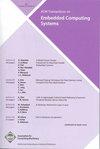Optimizing Dilithium Implementation with AVX2/-512
IF 2.8
3区 计算机科学
Q2 COMPUTER SCIENCE, HARDWARE & ARCHITECTURE
引用次数: 0
Abstract
Dilithium is a signature scheme that is currently being standardized to the Module-Lattice-Based Digital Signature Standard by NIST. It is believed to be secure even against attacks from large-scale quantum computers based on lattice problems. The implementation efficiency is important for promoting the migration of current cryptography algorithms to post-quantum cryptography algorithms. In this paper, we optimize the implementation of Dilithium with several new approaches proposed. Firstly, we improve the efficiency of parallel NTT implementations. The overhead of shuffling operations is reduced in our implementations, and fewer loading instructions are invoked for the precomputations. Then, we optimize the sampling and bit-packing of polynomial coefficients in Dilithium. We can handle double the number of coefficients within one register using a new approach for the sampling of secret key polynomials. The approaches proposed in this paper are applicable to implementations under AVX2 and AVX-512 instruction sets. Take Dilithium2 as an illustration, our AVX2 implementation demonstrates improvements of 22.7%, 16.9%, and 13.5% for KeyGen, Sign, and Verify compared to the previous implementation.利用 AVX2/-512 优化 Dilithium 实施
Dilithium 是一种签名方案,目前正被美国国家标准与技术研究院(NIST)标准化为基于模块晶格的数字签名标准。据信,即使面对来自基于晶格问题的大规模量子计算机的攻击,它也是安全的。实现效率对于促进当前加密算法向后量子加密算法的迁移非常重要。本文提出了几种新方法来优化 Dilithium 的实现。首先,我们提高了并行 NTT 实现的效率。在我们的实现中,洗牌操作的开销减少了,预计算所调用的加载指令也减少了。然后,我们优化了 Dilithium 中多项式系数的采样和位打包。我们使用一种新的密钥多项式采样方法,可以在一个寄存器内处理双倍数量的系数。本文提出的方法适用于 AVX2 和 AVX-512 指令集下的实现。以 Dilithium2 为例,与之前的实现相比,我们的 AVX2 实现在密钥生成、签名和验证方面分别提高了 22.7%、16.9% 和 13.5%。
本文章由计算机程序翻译,如有差异,请以英文原文为准。
求助全文
约1分钟内获得全文
求助全文
来源期刊

ACM Transactions on Embedded Computing Systems
工程技术-计算机:软件工程
CiteScore
3.70
自引率
0.00%
发文量
138
审稿时长
6 months
期刊介绍:
The design of embedded computing systems, both the software and hardware, increasingly relies on sophisticated algorithms, analytical models, and methodologies. ACM Transactions on Embedded Computing Systems (TECS) aims to present the leading work relating to the analysis, design, behavior, and experience with embedded computing systems.
 求助内容:
求助内容: 应助结果提醒方式:
应助结果提醒方式:


